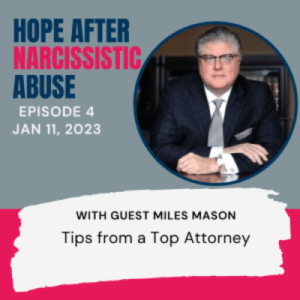What Is Financial Abuse in a Marriage?
- At February 03, 2023
- By Miles Mason
- In Divorce Tips, Domestic Violence, Family Law, News
 0
0
What is considered financial abuse? A divorce lawyer’s experience with financial abuse. Which situation is an example of financial abuse? Narcissism, financial abuse, and finances.
Miles Mason, Sr. guests on the new podcast by Amy Helms, Hope After Narcissistic Abuse, Jan. 11, 2023. Mason’s podcast episode link: Financial Abuse During Divorce. Podcast platforms include Apple, Spotify, Google, and others.
Amy Helms:
Let’s start off with: What is financial abuse?
Miles Mason:
Financial abuse is crossing the line between smart budgeting and control. So many people believe that in order to eventually retire, you’ve got to have a pretty strict budget and stick to it. Fine. That makes perfect sense. But what tends to happen, if one of the parties is very controlling, is that they try to clamp down on spending. Well, spending is an adult activity. And what you’ll see is that there’s this progression over time ratcheting up the level of control, including but not limited to, say, limiting access to marital funds, limiting access to credit cards, and limiting ways to use those funds. So, there’ll be a strict budget, and, you’ll eventually see, especially now that technology is such an important part of our lives, the abusive spouse will have fraud alerts and get notifications upon anything being spent by the other spouse.
Now what that means is while controlling spending is in general a good idea, what it turns into is the abused spouse not being able to spend any money on themselves, and/or not having access to financial resources to, say, consult with a lawyer or do anything that’s not pre-approved by the other spouse. Well, at some point we cross over that line, and it becomes a situation that’s almost as bad as physical abuse, because it’s going to change a person’s personality over time. The design is to erode the self-esteem, self-confidence, and the ability of that person to make smart decisions in their own best interest.
Amy Helms:
So, then it becomes isolating because you don’t have the resources to really do anything.
Miles Mason:
Right. Including therapy.
Amy Helms:
Right. When I was married, we had a spreadsheet that turned into a profit loss statement, turned into pie charts, and each one spreadsheet fed into the next. And I was supposed to itemize hairspray, baby wipes, and then the groceries were dry goods or grocery or pantry and then refrigerated, present foods. And then in there, there were categories, and from that it had categories. And then at profit loss statement, it turned into the grocery store versus eating out and then children versus adults. And it was asinine, but if I didn’t do it, there was trouble and I had to explain for it.
Miles Mason:
I guess one way, as a CPA, I see the spreadsheets as a wonderful thing for those financial people. We love spreadsheets. The question is, is there a budget item for other? So, I don’t have a problem with budgeting. I don’t have a problem with spreadsheets, but it is the first step towards crossing that line into negative control because you need to budget for what you don’t know, for life. If you’re saving for a trip to Disney World, that needs to be in the spreadsheet. And I guess one of the telltale signs would be if the supported spouse feels uncomfortable asking for something for themselves. And I’m not talking about a $1,500 pair of shoes. I’m talking about just basic 200 bucks a month to go see a therapist. And if you don’t feel comfortable asking for that, that’s a big red flag for me.
Amy Helms:
And I guess those need to be two-way conversations about how we’re going to budget and what those categories are. Can it be items for children’s healthcare, or can it be items we use to get ready in the morning? Or does it have to be minute little categories that would take a long time to do, to prepare that budget? So how is this used in a divorce process against each other?
Miles Mason:
Okay, so-
Amy Helms:
We have relationships versus divorce.
Miles Mason:
Right. So, let’s say I have a spouse in my office that’s been the victim of financial abuse. Most of the time, they won’t know they’ve been a victim, just like emotional abuse. So, I’ll figure that out probably an hour into the initial consultation, maybe 20 minutes, who knows. But what’s very interesting about it, there’s a couple of different problems. Identifying the behavior is step one. Step two is figuring out what we do with it.
Now my experience has been often positive, because if the divorce has fallen through, there’s money in the estate because the spouse was very frugal. And in one of my most memorable cases, I represented the wife of a neurologist. And the neurologist was fanatical about saving money, which is good because my client had been married a long time. They didn’t live in a big, expensive house. He didn’t drive a big expensive car. And there was a significant amount of money to divide, which allowed my client to not really have to work that much after the divorce, which is nice.
But the other side is what was the damage to the emotional core processor, if you will, of the abused spouse? So, this particular spouse didn’t have restrictions. She can still do art, she could still do a lot of things, but it was certainly frowned upon and made her upset about it. Now, once we identified that we have the financial abuse situation, one of the positives is that I’ve got the financial records to the penny. We need to get a copy of those spreadsheets, a copy of the program, because a lot of couples have personal financial software that they use because it’s super easy to pay bills now and all that other kind of stuff. So, in some ways it makes my job easier.
Where it makes it tremendously difficult is for my client to begin the recovery process. And the only way we can get the person into starting the recovery process is to convince them that they need recovery, that they need therapy and counseling. And that’s one of the things I ask every therapist and counselor I ever talk with, “Do you have advice for the lawyers on how to convince somebody who’s been the victim of abuse that they need to go talk about it and understand how it impacts their personality and decision-making?” And the reason that’s terribly important is we’re going to have a divorce settlement coming within the next 3, 6, 9 months, maybe even a year, and we need our client to exercise clear judgment and not be colored by the emotional damage that’s occurred over a long period of time and that’s seeped into their personality and their confidence in their decision-making.
For more, see Miles Mason’s The Complete Guide to Divorcing a Narcissist, a seven part video series.
Learn more about Amy Helms, her therapy practice, and her podcast here.











